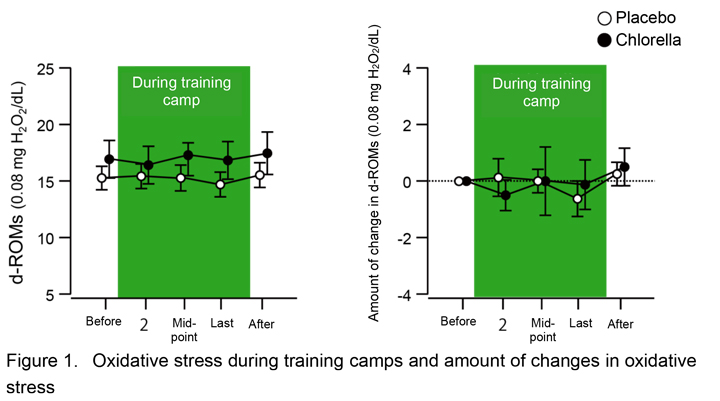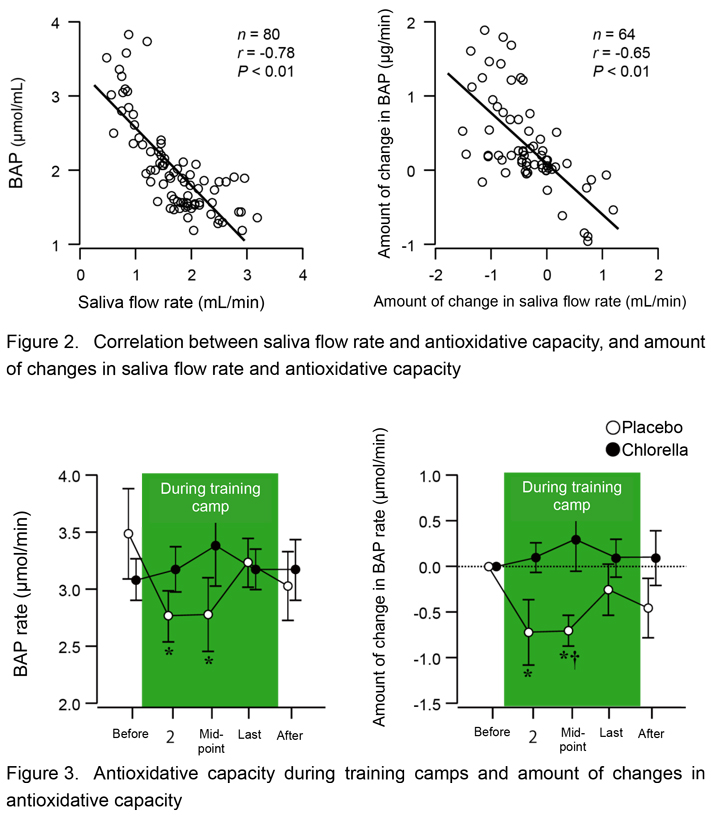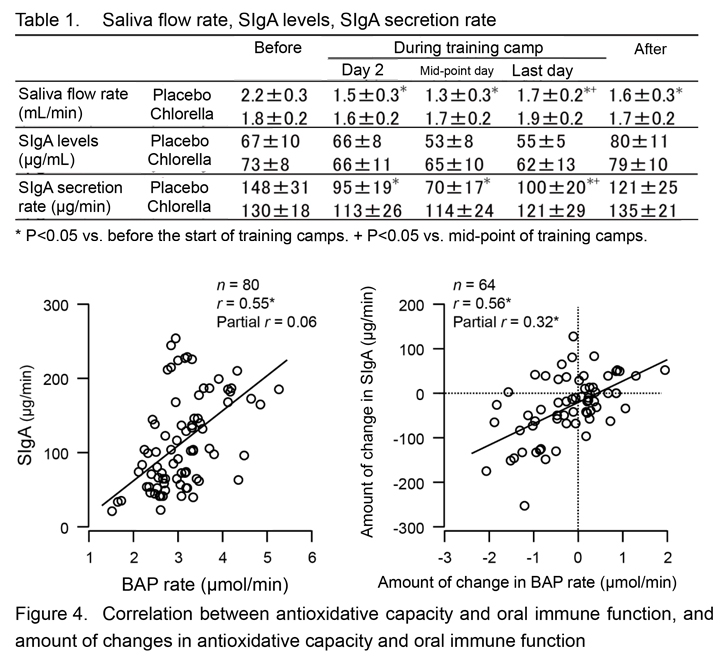- TOP
- List of reports
- Chlorella intake attenuates reduced salivary antioxidant capacity in female kendo training camp
participants
Chlorella intake attenuates reduced salivary antioxidant capacity in female kendo training camp participants
【Scientific information】
Research and Development Department, Sun Chlorella Corporation
Chlorella intake attenuates reduced salivary antioxidant capacity in female kendo training camp participants
This study was published in the “Japanese Journal of Exercise and Sports Physiology”.
- Research objectives
- In studies conducted in college kendo (Japanese fencing) athletes to date, the intake of chlorella has been reported to suppress decreases in secretory immunoglobulin A (SIgA, an indicator of oral immune function) in saliva during training camps. *1 In addition, the duration and intensity of training exercises were reportedly longer than usual during training camps and antioxidative capacity reportedly decreased with intensive sports training for kendo. *2
In the present study, whether or not the increase in oxidative stress and the decrease in antioxidative capacity during training camps can be suppressed by the intake of chlorella, which contains carotenoids such as antioxidant β-carotene and lutein and contains various nutrients, was investigated. Saliva was used to evaluate the relationship between antioxidative capacity and SIgA.
*1 Otsuki et al. Nutrition Journal, 2012 https://pubmed.ncbi.nlm.nih.gov/23227811/
*2 Imai et al. Advances in Exercise and Sports Physiology, 2005 https://ci.nii.ac.jp/naid/110002972712
- Study method
- Eight female college kendo athletes who participated in a joint spring (6 days) and summer (4 days) training camps conducted by multiple university kendo teams were randomized into two groups and took 30 tablets of chlorella or placebo in a cross-over design, in the morning and evening, from 4 weeks before the start of spring training until 3 days after the training. Saliva was collected before the start, during (Day 2, mid-point, last day), and after the training. In the summer, the same participants underwent the same experiment with the tablets switched. Saliva was collected by asking participants to chew on sterile cotton at a rate of once per second and absorbing the secreted saliva into the cotton, after which the saliva flow rate was calculated as the amount of saliva secreted per minute from the total amount of saliva.
Derivatives of reactive oxygen metabolites (d-ROMs), an index of oxidative stress, and biological antioxidant potential (BAP), an index of antioxidative capacity, were measured using an oxidative stress/antioxidative capacity measuring device. SIgA levels, an indicator of oral immune function, were measured using enzyme immunoassays, and SIgA secretion rate was also calculated.
- Results
- A correlation was not found between the amount of change in saliva flow rate and the change in d-ROMs from before the start of training camps and each time point.
In addition, changes in d-ROMs were not observed during training camps. (Figure 1)
On the other hand, a negative correlation was observed between the amount of changes in BAP and changes in saliva flow rate. (Figure 2)
If the amount of saliva secretion decreases due to a decrease in water content in the body due to intensive training, the antioxidative capacity may be overestimated due to the concentration of saliva. Thus, the BAP rate was calculated as the product of BAP and the saliva flow rate and used for evaluation. The results showed that BAP rate during training camps was lower than before the start in the placebo group; however, in the chlorella group, a change from before the start was not observed. (Figure 3)
SIgA secretion rate, an index of oral immune function, decreased in the placebo group during training camps; however, a decrease was not observed in the chlorella group. (Table 1)
In addition, there was a correlation between the amount of change in BAP rate associated with training camps and the change in SIgA secretion rate, which was observed even when the effect of saliva flow rate was excluded. (Figure 4)
These results suggest that antioxidative capacity decreases during training camps, and that chlorella suppresses this decrease. Furthermore, the suggestion was that the suppression of decrease in salivary antioxidative capacity by chlorella intake may be related to the suppression of the decrease in oral immune function during training camps.



Details
- Publishing journal:
- Japanese Journal of Exercise and Sports Physiology
- Title:
- Chlorella intake attenuates reduced salivary antioxidant capacity in female kendo training camp participants
- Authors:
- Takeshi Otsuki1), Kazuhiro Shimizu2),3)
- Affiliation:
- 1) Ryutsu Keizai University, Faculty of Health & Sport Sciences;
2) Japan Institute of Sports Sciences
3) University of Tsukuba, Graduate School of Comprehensive Human Sciences





